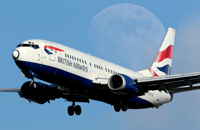BA postpones retirement of 737-400 fleet

British Airways is to defer replacing by at least three years its 19 Boeing 737-400s, as the carrier tries to reduce capital expenditures to offset the impact of the economic downturn.
Keep reading this article by becoming a FlightGlobal member now
PLEASE REGISTER FOR FREE OR SIGN IN TO CONTINUE READING

You have reached your limit of free articles for this period. Register for a FREE account to read this article and benefit from:
- Increased access to online news and in-depth articles from:
- FlightGlobal Premium covering the global aviation industry
- Airline Business providing insight for business leaders
- Weekly newsletters on topics across the industry
